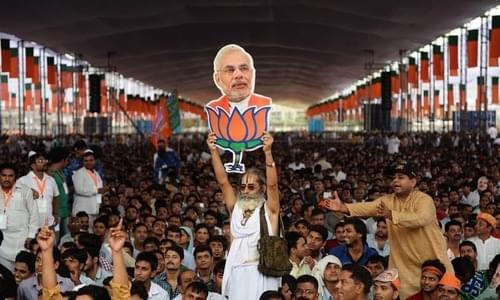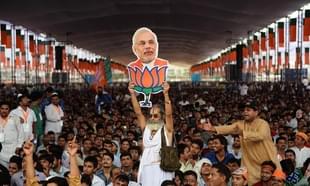Commentary
Why Does the Popular Mood in Delhi Favour Mr.Narendra Modi?
Saideepak
Mar 10, 2014, 04:31 PM | Updated Apr 29, 2016, 12:56 PM IST
Save & read from anywhere!
Bookmark stories for easy access on any device or the Swarajya app.


Over the past few weeks, I have been talking to members of the legal fraternity, and the one incontrovertible fact is this- Mr.Narendra Modi is largely seen as the decisive leader who is the need of the hour. Of course, there are people who cannot digest this growing consensus and to add salt to their wounds, their one great anti-Modi hope, the Aam Aadmi Party (AAP), is busy unravelling and imploding on its own with its daily dose of shenanigans and lies.
In my discussions with several members of the Bar, the attempt has been to understand their thoughts on the UPA and AAP, and the reasons for the surge in pro-Modi sentiments. Among the several issues that have caused genuine alarm and concern in the minds of public-spirited members of the Bar (some of who are not traditional supporters of the BJP), the most important one is the fact that rampant wheeling and dealing by the Congress-led UPA has crippled the security apparatus of the country and has rendered it vulnerable against better prepared and superiorly equipped potential aggressors like China.
The consensus is that not a single weapons systems deal which is beneficial for the country can ever see the light of the day without senior members of the Government and middlemen wetting their beaks.
Also, the manner in which a deeply venerated and admired patriot such as the former Army Chief, General V.K.Singh, was treated to allegedly favour the elevation of an alleged relative of the “personally incorruptible” Dr.Manmohan Singh has contributed significantly to the disgust in the Bar for the current dispensation. Although these allegations were denied by the Prime Minister’s Office (PMO), the very fact that such allegations are being perceived as being credible, speaks volumes of the disservice Dr.Singh has done to the post of the PM and the disrepute he has brought to it.
In fact, this episode has drawn comparisons with Nehruvian nepotism which saw the humiliation of the legendary Army Chief General K.S.Thimayya at the hands of Nehru, and preferential treatment being showered upon the pro-Nehru Lt.General B.M.Kaul, who was ultimately responsible for the catastrophic and blunderous handling of the 1962 Sino-Indian conflict.
What is also disturbing is that, apart from having presided over one of the most brazenly corrupt governments any major democracy has seen in modern history in the name of “coalition dharma”, the fact that Dr.Singh was personally in-charge of the coal ministry during the scandalous allocation of coal blocks has invited derisive scoffs at any claim of “personal incorruptibility”.
As lawyers, the concept of vicarious responsibility/liability of the head of the Government for the errant acts of his cabinet members with his knowledge makes it impossible for us to put up with or buy any done-to-death cliché about Dr.Singh’s lack of personal involvement. With the surfacing of the coal allocation scam under the personal stewardship of Dr.Singh, even that indefensible defence has been blown to smithereens.
To add to it, not a single sensible soul in the Bar is willing to buy the argument that power and pelf do not interest Dr.Singh or his puppeteers, with all signs being to the contrary. The fact that Dr.Singh has rendered the post of the PM and the interests of the nation subservient to his party’s “High Command” (why can’t we just name Sonia Gandhi?!) and her non-achieving over-glorified son is a particularly familiar and unsavoury scenario to first-generation litigators.
Being in a profession which has more than its fair share of dynasties with a vice-like grip on the market, and where a first-generation outsider has only talent and hard work to fall back on, young litigators are probably the first ones to detest the constant pampering of Rahul Gandhi.
For precisely the same reason, they are perhaps the first ones to recognize and appreciate the rise of Mr.Narendra Modi in a dynasty-infested political landscape. Mr.Modi’s lack of pretention and his no-nonsense approach towards vital issues of national importance immediately resonate with first-generation litigators who have risen through the ranks by sheer dint of hard work and an iron indomitable will against well-heeled, well-entrenched, and well-connected competitors and detractors. In a way, to this section of the electorate, Mr.Modi represents the talented and industrious underdog who is finally getting his due on the national stage after over a decade of vilification.
When asked about their views on AAP, the lawyers I spoke to said that they were cautiously optimistic at the beginning, but ultimately were let down by the constant agitation and turmoil with very little focus on governance. Even the most die-hard supporters of AAP, some of who are my close friends, admit that the party has become a circus and is fast hurtling towards disintegration.
Senior and respected members of the Bar are aghast and positively alarmed at the number of former Maoists (eg: Sabyasachi Panda) and individuals with marked separatist tendencies (eg: Kamal Chenoy Mitra) who are jumping onto the AAP bandwagon to lend a facade of credibility to their anti-national goals in the name of political diversity, free expression and of course “secularism”.
With AAP’s resident Digvijay Singh, Mr.Prashant Bhushan, openly lending support to every anti-Indian group, be it Kashmiri separatists or the Church-driven anti-Kudankulam clique led by S.P.Jayakumar and Rev. Fr. M.P.Jesuraj, the true agenda of AAP remains deeply suspect. This has had the effect of weaning away well-meaning fence-sitters in the Bar who were, at one point, willing to set aside their cynicism and repose faith in the political alternative that AAP represented to them.
One of them had this to say: “a man-child and a self-confessed anarchist are really no options. I am no Hindutva-wadi, but I’d rather give Modi a chance to see if he can deliver on his promises to improve our lot. That’s all I care for”. Clearly, Mr.Modi’s governance-driven manifesto has connected well with even the individualist voter who does not have an iota of interest in nationalist sentiments. This, I think, is an important factor which may well result in galvanizing non-Hindutva-wadi fence-sitters to vote for Mr.Modi.
The interesting thing about the views that I encountered in the course of my discussions is that, contrary to what the Left-leaning Delhi elite chatterati and media houses would have us believe, the Delhiite is not in thrall of the so-called revolution in Indian politics that AAP was made out to be barely two-and-a-half-months ago. In fact, young lawyers who had initially enthusiastically registered as members of AAP have completely distanced themselves from the party largely because of the public buffoonery and boorish behaviour that have become definitive traits of AAP.
Also, contrary to what Sagarika Ghose and her ilk would have us believe, Mr.Modi’s core constituency is not restricted to Hindutva-wadis or NaMo-wadis or “Internet Hindoos” anymore. The average voter, regardless of his faith or caste, who has no interest in or patience for ideological issues, and whose primary or even sole concern is the quality of life she or he can provide for her/his family, is as much a part of Mr.Modi’s core constituency as the Hindutva-wadi. This, I suspect, is the reason for AAP’s growing sense of despair and frustration which it vents in the only manner its Maoist members know and are capable of- violence.
Sai is an engineer-turned-Advocate, High Court of Delhi. He is founder of the “blawg” “The Demanding Mistress” and tweets @jsaideepak.





